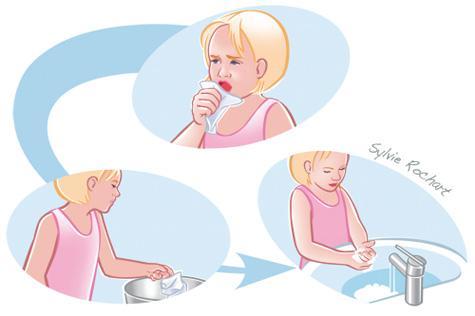What is a contagious disease?
Contagious diseases are caused by microbes, such as viruses and bacteria. Bacteria are living single-cell beings. They cause diseases such as colds or pneumonia. Viruses are microorganisms that must contaminate a host in order to reproduce. They cause diseases such as the flu and chicken pox. Contagion corresponds to the spread of microbes. This occurs with an incubation period that is specific to each disease. Direct contagion occurs through the air, when coughing or sneezing, or by direct skin contact. Indirect contagion occurs via an intermediary, such as food or wastewater, as is the case for cholera.
Which diseases are common in children?
Whooping cough
Whooping cough is caused by a bacteria, which is present in the nose, mouth and throat of those who are infected. Transmission occurs via coughing and sneezing. The disease manifests itself by coughing fits accompanied by a feeling of suffocation. The best protection against whooping cough is vaccination, recommended for children beginning at 2 months of age.
Mumps
Mumps is caused by a virus that affects the salivary glands. Transmission occurs via saliva or urine. The disease manifests itself by fever, headaches and earaches. The salivary glands swell and impede chewing. Testicular inflammation is a rare complication. Vaccination is recommended at around 12-15 months of age.
Measles
Very contagious, measles is caused by a virus. It is spread through coughing and sneezing. The disease manifests itself by nasal congestion, coughing and a high fever. Then, a rash appears on the face, then it spreads to the chest, arms and legs. Complications are rare: inflammation of the ear, pneumonia and inflammation of the brain. Vaccination is recommended around 12-15 months of age.
Rubella
Caused by a virus, rubella is spread by nasal and throat secretions. The disease manifests itself by a low fever and a mild cold. A skin rash can appear. Often, the lymph nodes in the neck swell. Vaccination is recommended around 12-15 months of age.
Chicken pox
Very contagious, chicken pox is caused by the varicella zoster virus and is transmitted by direct contact. It begins with a fever, followed by a rash accompanied by strong itching. Red spots turn into liquid-filled blisters that dry up. A vaccine against chicken pox is recommended for immunodeficient children.
Meningitis
Meningitis is an inflammation of the meninges, the membranes covering the brain and spinal cord, caused by viruses or bacteria. There are several types of meningitis:
- The most common, viral meningitis, for example, is caused by a mumps virus, which is not serious.
- Bacterial meningitis. Even where infection is treated and the patient survives there can be serious after effects.
- Meningococcal meningitis is the most problematic. It often occurs as a school epidemic. There are vaccines against meningococcal A and C. A vaccine against meningococcal B is being developed.
What measures should be taken if my child catches a contagious disease?
You should contact the school promptly to inform it that your child is sick. Upon your child’s return to school, you need to write the teacher a note explaining the reason for your child’s absence. You do not need to provide a doctor’s note justifying your child’s absence unless your child contracted a contagious disease such as whooping cough, meningococcal meningitis, measles, mumps, rubella or Scarlet fever. In the event of an epidemic, especially in the case of meningococcal meningitis, the health authorities will be in charge of finding the children who may have been in contact with the disease in order to prescribe antibiotics or a vaccine, depending on the type of meningococcus
How can I protect my children and other children from contagious diseases?
By vaccinating your child. By following some simple hygiene rules:
- Teach your child to regularly wash his/her hands, especially before eating or preparing meals.
- Teach your child to put a tissue in front of his/her mouth when he/she coughs or sneezes.
- Teach your child to throw out paper tissues in the trash.
- Keep your child at home for the duration of the contagious period and inform the school.
- Regularly wash your child’s toys.

You can protect your children against measles, mumps and rubella by giving them a single vaccine, called MMR.
ABBEY FIGURES
| GENERAL PRACTITIONERS | 4 |
| REGISTRAR | 1 |
| NURSES | 3 |
| STAFF MEMBERS | 13 |
| CONSULTATION ROOMS | 6 |
| SURGICAL ROOMS | 1 |
OPENING HOURS
| Monday – Friday | 9:00 – 13:00 |
| 14:00 – 17:30 |
